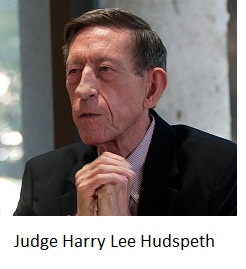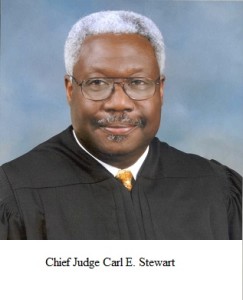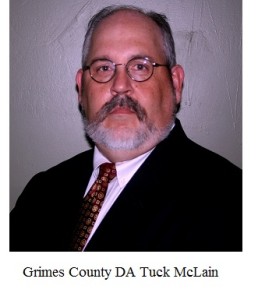An email that I received this afternoon adds to the evidence that U.S. District Judge Harry Lee Hudspeth retired rather than face judicial discipline for covering up sexual misconduct by another judge, while an affidavit alleges that Grimes County District Attorney Tuck McLain committed crimes in order to retaliate against a defense attorney.
 First, the email from Shelley Saltzman, an assistant to Chief Judge Carl E. Stewart of the Fifth Circuit, confirmed that retirement would typically terminate a judicial misconduct case. Judge Hudspeth was the chief judge of the Western District of Texas in 1998, when Judge Walter S. Smith, Jr. grabbed and groped a female deputy clerk in his chambers (apparently while he was drunk on the job). The victim later testified that Judge Hudspeth covered up the incident after she reported it.
First, the email from Shelley Saltzman, an assistant to Chief Judge Carl E. Stewart of the Fifth Circuit, confirmed that retirement would typically terminate a judicial misconduct case. Judge Hudspeth was the chief judge of the Western District of Texas in 1998, when Judge Walter S. Smith, Jr. grabbed and groped a female deputy clerk in his chambers (apparently while he was drunk on the job). The victim later testified that Judge Hudspeth covered up the incident after she reported it.
Last Monday, I sent a letter to Chief Judge Carl E. Stewart of the Fifth Circuit asking why the case against Judge Hudspeth had lingered for 18 months when the case against Judge Smith had been decided six months ago. Shortly after sending the letter, I learned that Judge Hudspeth retired quietly on January 31, 2016, shortly after Judge Smith was reprimanded and suspended.
Last Thursday, I sent an email to Ms. Saltzman asking whether Judge Hudspeth’s retirement ended the judicial misconduct case and, if so, whether the investigative report would be released. “Ordinarily, retirement from judicial office results in the dismissal of pending complaints of misconduct or disability,” she wrote this afternoon. “However, because the related case 05-14-90120 is still being considered by the [Judicial Conference of the United States] committee, the complaint against Judge Hudspeth is currently being held in abeyance.”
Translation: Since I appealed the slap-on-the-wrist punishment of Judge Smith to the Judicial Conference, the Fifth Circuit is holding the case against Judge Hudspeth in limbo. With respect to my second question — whether the investigative report will be released — Ms. Saltzman directed me to Rule 24 of the Rules for Judicial-Conduct and Judicial-Disability Proceedings. According to subsection (a)(2), the investigative report should be made public, but the Fifth Circuit Judicial Council has the option of keeping Judge Hudspeth’s name private.
 That would be pointless in this case, however, because I’ve already shared Judge Hudspeth’s name publicly. So I’m still wondering why the Fifth Circuit is holding the investigative report in limbo, because the outcome of my appeal should have no bearing on the case against Judge Hudspeth.
That would be pointless in this case, however, because I’ve already shared Judge Hudspeth’s name publicly. So I’m still wondering why the Fifth Circuit is holding the investigative report in limbo, because the outcome of my appeal should have no bearing on the case against Judge Hudspeth.
The more important issue in my letter to Chief Judge Stewart, however, is the six-month delay in investigating my second judicial misconduct complaint against Judge Smith. As the Waco Herald-Tribune reported last week, the state bar filed charges against attorney Greg White of Waco concerning his representation of Judge Smith in the first misconduct case. Mr. White and Judge Smith concealed their attorney-client relationship from other parties who appeared before Judge Smith and opposite Mr. White.
In the six moths between the time that I filed the bar grievance and the time that the state bar filed charges, Chief Judge Stewart has held my related misconduct complaint in limbo, neither dismissing it nor appointing an investigative committee. Why the delay? The letter also explains that I have been “reliably informed” that the Fifth Circuit’s investigators were told not to explore other alleged incidents of sexual misconduct involving Judge Smith.
Back in February, I requested an FBI investigation after learning that Mr. White may have provided some legal services to Judge Smith at no charge, an illegal gift at best and a bribe at worst. Since Chief Judge Stewart never responded to my original request for a criminal referral, I asked Chief Justice John Roberts to make the criminal referral.
GETTING EVEN
 Last week, The Bryan-College Station Eagle reported that we amended our lawsuit against Grimes County Sheriff Don Sowell, Grimes County DA Tuck McLain, and other officials, alleging that Mr. McLain retaliated against my client and my co-counsel, John Quinn, after we filed the federal lawsuit. The new allegations can be found in Paragraphs 31-33 of the amended federal complaint.
Last week, The Bryan-College Station Eagle reported that we amended our lawsuit against Grimes County Sheriff Don Sowell, Grimes County DA Tuck McLain, and other officials, alleging that Mr. McLain retaliated against my client and my co-counsel, John Quinn, after we filed the federal lawsuit. The new allegations can be found in Paragraphs 31-33 of the amended federal complaint.
Retaliation is not just bad manners, it’s a crime, so I filed a bar grievance against Mr. McLain and asked the FBI and the Texas Rangers to investigate. In an April 29, 2016 affidavit, Mr. Quinn provided details of Mr. McLain’s retaliation, and I have since forwarded the affidavit to the bar, the FBI, and the Rangers. I was planning to ask U.S. District Judge Alfred H. Bennett of Houston for a temporary restraining order against Mr. McLain, but first I’ll be conferring with Mr. McLain’s lawyers on Wednesday. Stay tuned.
With simple controls, Geometry Dash Lite a killer soundtrack, and incredibly satisfying gameplay, it’s no wonder this title remains one of the most popular mobile games years after its release.
Agario in my opinion, perfectly encapsulates the concept of survival: adapt, develop, and exercise caution to avoid being eaten. The simplicity of it is almost poetic.
Welcome to the sparkling universe of run 3, where the challenge of running in low gravity meets the exhilaration of speed! Expect to embark on an adrenaline-pumping journey through the scintillating cosmos, where every twist and turn will challenge your reflexes and determination. Come prepared.
Judge Hudspeth retiring quietly on January 31 really caught my eye